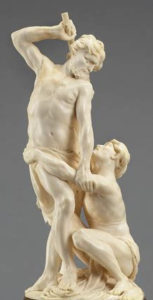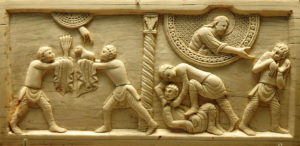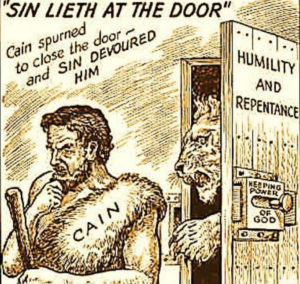
Cain and Abel Narrative Often Viewed
Via Lens of Myth, Conjecture or Gnosticism
Controlling Fear: Cain and Abel becomes a study once the myth, wild conjectures and Kabbalah mysticism of gnosticism is stripped away. Genesis first eleven chapters are extremely condensed in its explaination Abram’s, and the Jews’, origins. Some Jewish sources have Satan raping Eve to explain Cain’s evilness. Christendom views this event as a myth that occurred in prehistory as a means to explain the effects of the parent’s sin. Evangelical Christians are taught that this is an example of God rejecting works by accepting the proper sacrifice; a view that has little basis in this narrative. I believe this narrative shows the true struggle and character of the brothers to highlight the why of Cain’s murder of Abel: Struggle of Control (Ge 4:1-22).

Catholicism and its off-shoots Fixate on
Sacrifice Rather than Reason for Sacrifice
Historically, Cain is considered the first born of Adam and Eve but Scripture does not state this fact. Bible states Cain was born from Adam and Eve which is true of all people. However, we must account for people already present in Nod. If Cain were the oldest and this event occurred early in his life then any subsequent children had to be younger and still at or close to home. If Cain was much older this could account for older siblings rejecting God and leaving home to establish their own anti–God community. Or Cain was not the oldest but was considered the chosen by Eve due to some special characteristic not possessed by previous children, nor given to the reader (Ge 3:14-15). We do know Abel was younger than Cain; how much younger is not given. Other details are not mentioned: a priesthood, a sacrificial system, worship forms or rules such as the older should watch over the younger. One final observation; Adam is not mentioned except for being the sperm donor. There is no mention of his influence except to father other children after this event: Seth (Ge 4:25-26). What does the event teach us?
We do know their titles, names, in the New Testament. Cain’s name was given by Eve and means: given by God. This implies that she believes this child is the one God promised to bring balance to the world, reverse sin’s curse; Messiah. Abel means breath with the connotation of emptiness or worthiness. The Preacher uses this same word to convey the fruitless emptiness of life, {hebel; הֶבֶל}; striving after wind (Ec 1:14-18). Christ used this imagery when he told Nicodemus being born from above was like the wind; emptiness to those who are lost but of the Spirit to those who are saved (Jn 3:6-11).
Each man’s occupation is given implying importance. Abel was a shepherd. Was he the head shepherd or simply given this task to keep him out of the way of the real work, agriculture? There is an implication from the previous chapter that Adam’s choice of clothing, fig leaves (agriculture), was less important than God’s choice to clothe them in animal skins, husbandry (Ge 3:7, 21). Did God discuss with Adam and Eve the importance of animal sacrifice as a pointer to His coming Messiah? This was certainly a major emphasis with the call of Abraham (Ge 22:7-14).
Cain’s occupation as a tiller of the ground is instructive in Hebrew, though missed in English. Man {adam, אָדָם) was made from the dust (agar) of the ground {adamah, אֲדָמָה) (Ge 2:7). Notice that this word contains both the word for man and the word for blood (dam, דָּם) by which man will be redeemed (Le 17:11). Cain successfully worked the ground, adamah, demonstrating his prowess from which they were formed and which God had cursed {God would no longer control the ground, earth, but man would now have to exercise his own control, which is the duty of a god} (Ge 3:5). Cain was obviously successful. Abel just watched animals that took care of themselves; remember, there were no carnivores practices among people until after Noah’s Cataclysm. God also instituted the Ascending Offering, prohibition against eating blood and set for the statute of capital punishment for murder (Ge 9:1-6).
Cain and Abel brought sacrifices to God. Was this a special occasion? It appears so from Cain’s reaction to his rejection; perhaps this was his coming out as Messiah or a choice as to who would be Adam’s successor on his death? There is precedent for this in Joseph’s experience who was also a shepherd and made future patriarch over his older brothers who sought to kill him {Coat} (Ge 37:1-4, 18). Abel was a picture of coming Messiah and he suffered the same fate: Death for obedience (Is 53:1-9). Christ said Abel was a prophet meaning his actions spoke of God’s righteousness; like Noah’s by building the ark (Lk 11:49-51; He 11:4; 2Pe 2:5). God accepted the worthless one and rejected the given one which inflamed Cain; Abel would be Adam’s replacement as patriarch. As Abel lived in meekness; Cain would have to learn submission even as Christ (Ph 2:3-9). Cain, a product of high self-esteem, could not submit to Abel, product of man’s continual humiliation; his anger was so great it marred his very being.

Man Cannot Repent, Pride of his flesh;
It’s God’s Gift on all Who Acknowledge Failure
God, in mercy, encountered Cain telling him that he needed to control his sin; this is required of Messiah, like Christ, and of God’s people via the Spirit (Ga 5:22-23; He 2:14-18). God was telling Cain he needed to realize his failure and turn to God; i.e., repent and be saved (Ro 10;11-13; 1Co 5:6-8). Cain failed for the same reason he was previously successful; he relied on himself, his flesh he conquered the ground. Thus, he led Abel into the field and killed him, eliminating the one whom God chose; now he was like his true father, Satan who was a liar and murderer since his sin (Jn 8:44).
God confronted Cain after Abel’s murder; Cain exhibited sin’s self-centeredness, not his brother’s protecter. God removed from Cain that which He had given him which made him successful; i.e., this was the mark. It may have been a physical deformity which prevented Cain from working the ground. This humbling mark could have driven Cain to repent and turn to God for mercy; just like Abel. Yet, his hatred for God and Abel was so great he chose to leave God’s presence and the people who worshiped Him. Since he could no longer work, he wandered, nod, to the land of Nod, or wanderers; another Hebrew wordplay. People of Nod, raised to accept in his coming leadership, accepted him as leader (Ro 1:32). He achieved his dream with their submission to one who refused submission to man or God {Government} (Pr 14:28). Cain built the first cities implying he also was the father of government which was again emulated by Nimrod at Babel in rebellion to God (Ge 10:8-10; 11:1-9). It was corruption through Cain’s direct descendent that required God to bring the Cataclysm and reboot the salvation process.
Cain’s offering rejected because of his idolatry of covetousness: of himself (Col 3:5). Cain’s uncontrollable rage was ignited by fear, fear of losing his position. Hate is not the opposite of love. Fear, fear of judgment, opposes love; even God’s love (1Jo 4:13-20). Fear is the basis of hate and drove him to exercise fleshly control. His anger leading to murder was an expression of fear, and of God’s judgment (Mt 5:21-26). Sinners hate those who submit to God thereby demonstrating the righteousness of God’s judgment on their sin (Ro 2:1-12). Since they cannot control God, and their failure of exercising control in nature is masked by their control, persecution, of those who have been saved (Jn 3:16-21).
Why did God allow Abel’s death? Abel would go to Paradise (Lk 16:22-26). Cain would be shown a sinner, a beast, rather a man created by God. Such is the legacy of sin (Ge 3:1; Ec 3:16-18; Re 12:9). Man seeks to control fear; he might as well try to control wind for this is true hebel vanity.
